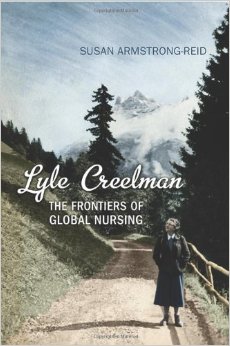 Creelman Hall is familiar to everyone in the University of Guelph community, and many know that the building is named for George Creelman, a former president of the Ontario Agricultural College.
Creelman Hall is familiar to everyone in the University of Guelph community, and many know that the building is named for George Creelman, a former president of the Ontario Agricultural College.
There’s another Creelman, a distant cousin of George’s, who was equally accomplished and who left her mark in the field of public health and nursing in Canada and internationally. Lyle Morrison Creelman died in 2007 at the age of 98, but U of G history professor Susan Armstrong-Reid interviewed her a few years previously and says, “She was a woman of strong character until the end.”
Creelman is the subject of Armstrong-Reid’s recent book Lyle Creelman: The Frontiers of Global Nursing. Says the author: “I was surprised that few Canadians had heard of her accomplishments; she was a pioneer of public health both in Canada and internationally.” She set out to remedy that.
“I didn’t want it to be a standard biography,” says Armstrong-Reid, who was given permission to use Creelman’s diaries and papers. “I felt it was important to put her work in a transnational context, since she was deeply involved in the transformation of nursing worldwide.”
Born in Nova Scotia in 1908, Creelman’s plans for a career in medicine were initially derailed by her father’s death. She became a teacher, with the goal of earning enough money to continue her education. She eventually graduated from the University of British Columbia with a degree in public health nursing in 1936.
Creelman was awarded a Rockefeller Fellowship, which allowed her to travel to New York to study with others from around the world. “It meant that her ideas about nursing were formulated as part of a global network of nurses,” says Armstrong-Reid. In the early years of the Second World War, Creelman oversaw the development of community-based nursing services in Vancouver, including Japanese families who were being interned in the city, giving her new perspectives on other cultures.
As the war ended, Creelman was hired by the United Nations Relief and Rehabilitation Administration (UNRRA) and became the chief nurse of the British zone of occupied Germany. The challenges of providing nursing care to millions of displaced people within an untried organization were immense. Creelman and her staff faced terrible conditions, such as concentration camps where the Germans had deliberately introduced typhus infections, and camps designed for 8,000 were crowded with more than 40,000 people.
As UNRRA’s work came to an end, Creelman returned to BC and was soon hired by the Canadian Nurses Association and Canadian Public Health Association to co-author the Baillie-Creelman Report, which assessed the status of public health nursing in Canada and made recommendations for improvement.
As Armstrong-Reid writes: “Creelman’s recommendations had sought to expose faulty assumptions, damaging stereotypes, and arrogant presumptions that had become institutionalized as the way things are done to the detriment of public health nursing.” Her ideas were very controversial at the time but have become part of the fabric of today’s public health.
In 1949, Creelman was appointed as one of two nursing consultants to the World Health Organization, based in Geneva, Switzerland. She remained with that organization for the next 19 years. Her vision of the nurse’s role conflicted with the WHO’s prevailing view at the time that championed the new medical technologies or “magic bullet” approach. In contrast, Creelman, a strong proponent of primary health care, worked hard to help others understand what was clear to her: nursing was the front line of health, and working within the community in a culturally sensitive manner (rather than imposing Western standards on them) was the only way to be effective.
Armstrong-Reid adds: “Creelman’s approach was ‘Go there, listen, and build on their ideas, needs and resources.’ She had a great ability to recognize talent. She was also very good at effectively delegating power, so she chose like-minded nurses and then let them get on with their tasks. She was never a micro-manager. But she had little tolerance for those who were foolish, or who lacked her dedication and drive.”
This little-known Canadian woman left behind a powerful global legacy and in the field of public health.
“Creelman’s voice still resonates today,” says Armstrong-Reid. “She spoke with new insights to the leadership challenges nurses continue to confront, both at home and around the world.”